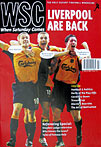 After their performance in the UEFA Cup final the Basque side Alaves found themselves with few enemies, even in other regions of Spain. But, says Phil Ball, things have already started to go wrong
After their performance in the UEFA Cup final the Basque side Alaves found themselves with few enemies, even in other regions of Spain. But, says Phil Ball, things have already started to go wrong
When Jordi Cruyff headed the equaliser for Alavés that took the UEFA Cup final against Liverpool into extra-time, there seemed a reasonable case for stopping the game and awarding the cup to both teams. Right now they’ll be squabbling over the rights to the official video, and desperately brainstorming an alternative title to Game of the Century.
It might have gone so right for Alavés, but in the post-coital glow of their performance things quickly turned sour. Within a week of the final, Milan announced they were signing Javi Moreno. Moreno is a fine player, but the last thing he should do is go to Italy. A quiet fellow, he seems unlikely to perform away from the small-club atmosphere in which he has prospered. But try telling that to his agent. Cosmin Contra, the Romanian full-back who led Jamie Carragher such a merry dance, will be the next to succumb, expected to sign, as he is, for almost every major side in Europe next season. No one outside Spain had actually noticed him before the final, but it is the same old depressing story. The side is about to be dismantled.
The secret of Alavés’ success lies in the happy mystery of coincidence and accident. The manager Mané, previously known for exploits outside the top division, is good at his job, but he cannot possibly have foreseen what was to happen when he began to assemble the side three years ago. It appears to be one of those rare cases where several rejected, run-of-the-mill players come together and immediately gel, for no apparent reason. Almost all of the players, including Moreno (who cost Alavés £65,000), had tried their luck elsewhere and been handed their cards.
Such players suddenly found themselves triumphant within a coherent, working unit, at a small provincial club. The very fact they have survived in the top division for the past three years is achievement enough, never mind their UEFA exploits. But despite the fact that their success has been based on the Three Musketeers’ philosophy – all for one and one for all – without Contra and Moreno the whole thing may fall terribly flat.
Even with the money the club are about to receive, the departure of these two crucial elements threatens to disable the whole unit. Mané’s decision not to take Héctor Cúper’s place at Valencia has been seen as an altruistic gesture, but the truth is more mundane. According to the rumour mill, Valencia balked at his insistence on bringing his entire backroom staff with him.
None of this would have mattered so much if the British press had managed to hide its predictable anglocentric myopia. But there they were, frothing over their lap-tops in a frenzy of orgasmic delight, as if Liverpool had vanquished one of Europe’s major footballing powers. I don’t want to begrudge Liverpool their victory, nor gloss over the symbolic significance of the win for the club, but a slightly more even-handed analysis would not have gone amiss.
Although several newspapers praised Alavés for their “contribution”, it was Liverpool who took the plaudits, with Jeff Powell claiming incomprehensibly that “triumph is the mother of inventive football”. Inventive football? From over here in Spain, the only interesting stuff I noticed came from Alavés, and although Liverpool were merciless in their punishment of the Basques’ slip-ups, it’s difficult to maintain the thesis that they were the better side overall.
Alavés are in the curious position of being liked by almost everyone in Spain. They are not so Basque as to be politically problematic, and not so Spanish as to be cold-shouldered by the local nationalists. The match attracted a TV audience of ten million – more than watched the Real Madrid v Bayern semi-final. The headline in the football tabloid Marca claimed One in four Spaniards cried along with Alavés! If for nothing else, it was significant that this pro-Madrid paper actually bothered to get emotional about somebody else for a change.
On the following Saturday, Barcelona offered to applaud Alavés on to the pitch, but their hosts declined, pointing out that they had won nothing. It doesn’t really matter that they lost, for Alavés will not be forgotten. But the tragedy is that football’s untimely sense of realpolitik is about to assert itself once more. While Liverpool look forward to the Champions League, Alavés have almost certainly had their 15 minutes.
From WSC 173 July 2001. What was happening this month